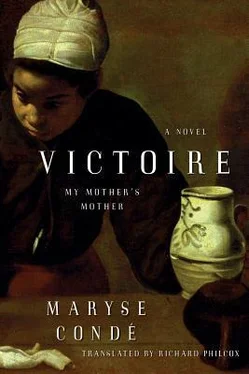“Pa ti ni konsomasyon san bénédisyon.” (No consummation without a benediction).
Dernier, however, was not entirely blinded by passion, if passion there was. He devised a project that was approved by the party cadres and comrades in La Pointe with whom he corresponded regularly. Together with Thérèse, he would be in charge of an association that aimed at teaching political awareness to the laboring masses on Marie-Galante by way of the arts. He proposed calling it “A Call to the Arts, Citizens.” Thérèse preferred “A Call to the Arts, New Citizens.” But Dernier thought the adjective useless, even redundant, and his decision prevailed. Literary nights, poetry evenings, and music recitals were held one after another in the newly painted town hall, but apart from the usual handful of Fulgence’s and Gaëtane’s friends, it remained hopelessly empty.
For the festival of Sainte-Cécile, Thérèse managed to have the philharmonic orchestra shipped over from La Pointe. The forty-three musicians in their blue and white uniforms and white helmets lined up in front of the town hall and played to perfection excerpts from Meyerbeer’s work. Apart from a few ragged urchins chewing on grabyo koko candies, not a peasant, farm laborer, fisherman, or worker took the trouble to turn up. Thérèse was so mortified she agreed to go along with Dernier, who suggested they concentrate their efforts on the school. At least there the audience is captive. The school principal, M. Isaac, an uptight mulatto, had hardened prejudices, but he feared Légitimus’s people and complied with every request.
Thérèse and Dernier then decided to form a choral society. Unfortunately, they were unable to come to an agreement. As a feminist, lest we forget, Thérèse insisted on including women’s voices and singing the famous “Hallelujah” chorus from Handel’s Messiah. Dernier, who was against mixing the sexes, was all for teaching the same songs that the socialists sang in the Workers Chorale in La Pointe.
Marie-Galante, however, was impatient to hear about their engagement.
Some indiscretions had revealed their affair. It’s true the lovers hid nothing. They galloped on horseback across the island to their trysts, Thérèse’s butt strapped tight into an old pair of her father’s trousers and her hair straightened with a hot iron and held in place by a net. They would meet in a cabin belonging to one of Dernier’s brothers. In order to make up for its modest surroundings, Dernier had brought in a bed made of locust wood and an oval mirror in which it was whispered the couple gazed at their reflection before the act of penetration. Despite all that, people were understanding. Firstly, because the sin of love is not a sin. And then putting Easter before Lent is no crime! Who hasn’t committed it? In fact, what marriage can claim to have escaped concubinage or béni-rété ? The young girls who hoped to be bridesmaids had selected their gowns from the Printemps catalog. Others got help from dress patterns. Thérèse, an artist to her fingertips, drew her wedding dress on sheets of ecru paper and showed the sketches to her mother’s dressmaker, who shook her head, helpless.
“An pé’é jen pé! ” (I could never manage that.)
Against all expectations, on December 23, 1889, Dernier Argilius slipped onto the steamer for La Pointe. A little surprised, Thérèse, however, did not worry inordinately about this trip. She knew he loathed celebrating Christmas in the Catholic manner. Like his political mentor, he dreamed of combining December 24 with the anniversary of the death of Victor Schoelcher, combining the savior of the black race with the liberator of the Jews. She only began to suspect the truth when some good souls came to inform her that Dernier had emptied his house in Les Basses of all his papers, clothes, and, above all, the books in his library. Utterly distraught, she ran over to Monsieur Isaac, who confirmed that Dernier Argilius had left Marie-Galante for good, and good riddance! At the request of Jean-Hégésippe Légitimus, he had turned his back on teaching to devote himself entirely to journalism. Later on he was to become director of the newspaper Le Peuple .
Thérèse went down on both knees to beg Fulgence — the outraged father who threatened to write straightway to Légitimus to tell him of his protégé’s unspeakable behavior — to remain silent. She reminded him that there had never been a promise of marriage in the true sense of the term. When she finally managed to get him to promise to stay put, she swallowed a whole bottle of what she thought to be arnica. In actual fact it was a purgative that Gaëtane had concocted with cassia and castor oil. Her entire body became inflamed. She defecated for a whole week and almost died: dehydration, sudden drop in blood pressure, and everything else. She regained consciousness only to be blinded by a photo on the front page of L’Emancipation: Dernier Argilius piously leading a pilgrimage to the Schoelcher museum, inaugurated with great pomp two years earlier, in front of a crowd of ecstatic workers. She fainted once again. After a month, she came through, but was so weak that Léonora Bilé, a Congolese, skillful in the art of herbs, came every day from Trianon to massage her wasted body with coconut oil macerated in balata bark.
It’s a common fact that misfortune never comes singly. Thérèse was gradually recovering from this abominable desertion when they discovered that Victoire, who as usual never said a word, never divulged a thing, was hiding a belly under her shapeless golle dresses. Danila, who had been spying on her for weeks, had noticed that she no longer washed her bloodstained rags once a month. To be honest, she had been nurturing deep down an unspeakable intuition. When she confided her suspicions to Gaëtane, the latter expressed her doubts. Didn’t Victoire take communion every Sunday at eight o’clock mass? Would she dare commit such a mortal sin? In order to back up her accusation, Danila had to force the unfortunate Victoire to bare the still modest yet incomparable calabash of a belly with a darker stripe down the middle and topped by an enormous tumbler of a belly button.
Pregnant!
For whom? By whom?
Like Oraison with Eliette seventeen years earlier, Fulgence was called to the rescue from his office at the town hall and unbuckled his belt. Victoire was less resilient than her mother. After five bloody lashes on her shoulders, she let it out, the name that Danila had not dared pronounce.
Thérèse fell into a swoon.
NOBODY WILL EVER know anything about the relations my grandmother Victoire had with Dernier Argilius.
That story has been erased. Deleted from memory. But I want to know.
I want to know how they communicated their desire, where they met and how many times. How did they manage to hide on an island where nothing is secret? Was Victoire pregnant straightaway? What drove her to him? Did her chaste adolescent heart become inflamed at first sight during that famous New Year’s lunch? Didn’t she have any consideration for her godmother, Thérèse, whose passion for Dernier was common knowledge? Or did she want to take revenge on her arrogance? Years later Thérèse told some close friends:
“Despite everything I did for her, she was always jealous of me. I could see that in her eyes, but I never took her seriously.”
She claimed that Victoire never felt anything for Dernier. All she was looking for was a man of standing, “a valid father.” She called her an ungrateful wretch, calculating and manipulating. I don’t believe a word.
As for Dernier, nobody will ever know why the man who possessed the most desirable young girl on Marie-Galante bedded also one of the most destitute. Nor why he turned his back on both of them at the same time.
Читать дальше












